Why Your Eyelids Might Start To Age Before The Rest Of Your Face
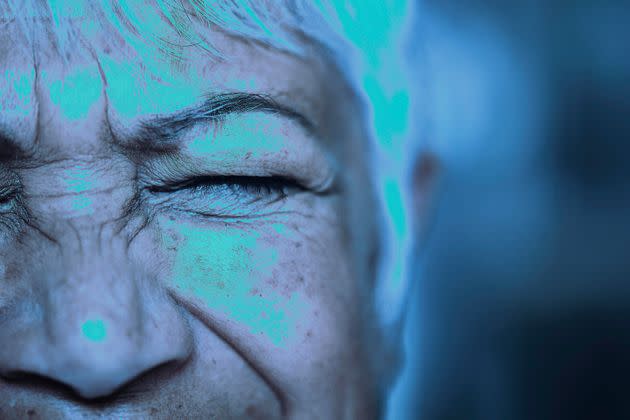
Between concealer, correctors and eye patches, it’s safe to say that the under eyes are a common area of concern for most people. But if you struggle with eyeshadow creasing or droopy eyes, the upper eyelids can be equally as frustrating.
Below, skin care experts discuss the causes, side effects and treatment options for eyelid wrinkles.
All About Eyelids
One of the main characteristics of eyelid skin is how thin it is. Compared to the skin on other parts of the face, the eyelids have a very thin epidermis (the layer that acts as a barrier to the environment) and the thinnest dermis (the layer responsible for the skin’s structure and resilience), said dermatologist Dr. Geeta Yadav.
“There’s just so little tissue in this area and beyond skin, there’s almost no fat at all,” she added. This thinness can lead to fragility and sensitivity.
“Eyelids are a common area for dermatologists to find allergic contact dermatitis, among other rashes,” said dermatologist Dr. David Li. “For instance, you can use a fragrance that seems to do fine on most parts of your body, but if you have an allergy to the ingredient and it contacts the skin of the eyelids, you may very well get a rash in the area.” Certain skin care ingredients, like retinol and exfoliants, can also lead to dryness in this area.
Does Blinking Cause Eyelid Wrinkles?
Not necessarily. According to Li, there are three main causes of eyelid wrinkles: muscle overuse or skin manipulation, free radical damage to our skin’s collagen and genetics.
“Blinking alone probably doesn’t increase the risk of eyelid wrinkles, but excess squinting or contraction of the muscles around the eyes can definitely create fine lines that lead to static wrinkles (wrinkles that are still present at rest) on the upper and lower lids,” Li said. For instance, if you tug at your eyelids frequently (either while putting on makeup, rubbing your eyes or pulling the eyes down to insert contacts), it could result in softened tissue laxity over time, which can exacerbate eyelid wrinkles.
Aging and a general loss of skin elasticity where the skin is not able to bounce back as easily can also contribute to eyelid wrinkles. “If you pull on the skin of a youthful person with supple skin, it’ll likely bounce back and recoil immediately, but as the skin loses collagen and elastin, it’s less likely to recoil immediately and may stay in the pinched position after releasing the skin — we call this a test of skin-turgor, or its ability to bounce back,” said Laura Fischer, an aesthetic nurse practitioner at SkinSpirit.
This loss of collagen and elastin can also make the eyelids prone to dehydration, which doesn’t necessarily cause eyelid wrinkles but can emphasize the lines in this area and make them appear more noticeable. (It’s worth noting that even youthful skin that’s dehydrated can still accentuate eyelid wrinkles.) The good news: This is temporary, and a moisturizing skin care routine can help.
Finally, smoking and excess sun damage can lead to eyelid sagging and wrinkles due to “damage to the underlying collagen, which serves as a scaffold to create that healthy and plump appearance to the skin,” Li said.
The Side Effects Of Eyelid Wrinkles
Because the skin on the eyelids is the thinnest skin on the face, it’s prone to showing signs of damage (like dehydration, loss of elasticity and lines) first, explained Fischer.
Also, while eyelid wrinkles don’t necessarily interfere with vision, they can affect overall structure and skin laxity, said ophthalmologist Dr. Diane Hilal-Campo. “Medical issues, genetics and aging can cause the skin of the eyelid to droop to the point that it affects one’s ability to see, which is known as dermatochalasis and ptosis,” she explained. “Mild to moderate ptosis can be temporarily addressed with a prescription eye drop, but more advanced cases may require a blepharoplasty, also known as a lid lift.”
Beyond this, trivial (albeit frustrating) side effects of eyelid wrinkles, like eyeshadow creasing, can also occur. “Our eyelids naturally crease when we open and close our eyes, and makeup can shift and build up in those folds, causing eyeshadow creasing,” said Yadav, adding that some eye shapes are more prone to creasing than others.
What To Do About Eyelid Wrinkles
According to Yadav, prevention can go a long way. “Protecting your eyes with sunglasses and using a retinol eye cream can help prevent the formation of wrinkles,” she said. Aside from these, ensure you get adequate amounts of sleep, avoid smoking and consume an antioxidant-rich diet.
Keeping the skin on the eyelids moisturized is also critical to avoid emphasizing any lines. Yadav recommended using hydrating skin care ingredients like hyaluronic acid and glycerin and then sealing in that hydration with ingredients like squalane and ceramides to create a plumper, smoother look on the eyelids.
If you’re looking for a more vigorous solution to your eyelid wrinkles, there are some in-office treatments available. “When patients are starting to notice more lines around their eyes, I strongly advise that they begin treating the full face and neck with collagen-stimulating treatments like microneedling, BroadBand Light, Moxi and Halo lasers,” Fischer said. This is because the eye area is often the first to display age-related changes, and if you’re noticing lines and wrinkles in this area, the rest of the skin is likely close behind it. “The sooner one starts effective skin care and minimally-invasive procedures, the longer they can hold off on the more invasive approaches,” she said.
Remember that while eyelid wrinkles are completely normal if you’re experiencing redness or sensitivity on the eyelid skin, this may be a sign of an infection like blepharitis or a skin condition like eczema, warned Hilal-Campo. “If you’ve noticed changes to your eyes,” Hilal-Campo added, “it’s important to see your eye doctor to diagnose the issue and come up with a treatment plan.”
Want help dealing with the skin around your eyes? Check out these products that HuffPost readers love.
HuffPost and its publishing partners may receive a commission from some purchases made via links on this page. Every item is independently curated by the HuffPost Shopping team. Prices and availability are subject to change.

Amazon
CeraVe eye repair cream
This dermatologist-recommended eye cream is a HuffPost reader favorite. Yummy, nourishing and potent anti-aging ingredients like hyaluronic acid, niacinamide and ceramides can help to increase hydration while smoothing and brightening the under-eye area. It's a great affordable option for someone who wants to add a bit of oomph to their routine without breaking the bank. This fragrance-free so it's ideal for people with extra sensitivities.
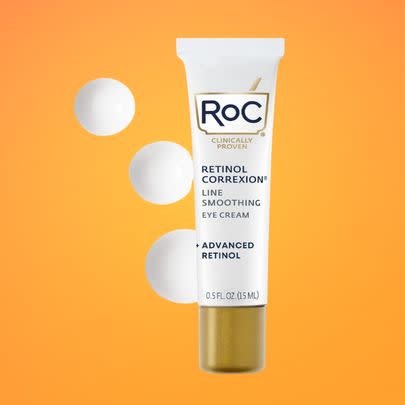
Amazon
RoC Retinol Correxion eye cream
This cult-fave and HuffPost reader-pick eye cream is wildly popular at Amazon, boasting over 16,135 five-star ratings from happy customers. It can help address common eye concerns like puffiness, dark circles and wrinkles thanks to its hydrating formula that's been infused with dermatologist Dr. Bradley Glodny-approved ingredients like retinol and antioxidants. Reviewers note that it works wonders on dark circles, in particular.
$17 at Amazon (regularly $29.99)
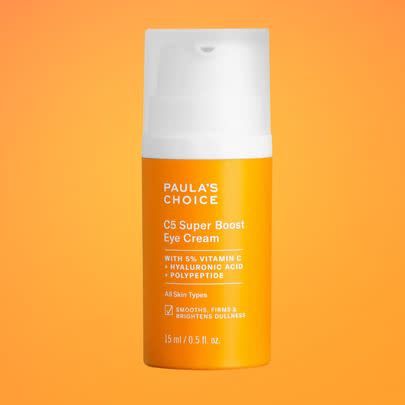
Sephora
Paula's Choice C5 Super Boost Vitamin C eye cream
Paula's Choice products are great, mid-priced options for people who want genuinely effective skin care with potent anti-aging ingredients. This vitamin C-rich eye cream is also formulated with hyaluronic acid and polypeptides that can help to firm up, brighten and smooth out the tender eye area. It's great for all skin types and those who want to address dark circles, skin texture, sagginess and more. It's a favorite among HuffPost readers, beauty writers and editors (like myself), who keep turning to the brand for high-quality, reasonably-priced products. Like the CeraVe eye cream, this one is also free of added fragrance.
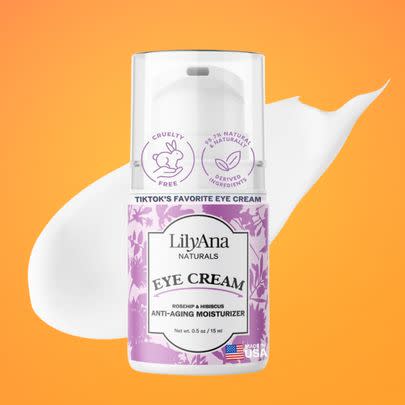
Amazon
LilyAna Naturals eye cream
This oft-viral LilyAna eye cream has been wildly popular with HuffPost readers for a couple years now, thanks to a super effective formula and reasonable price point. It's made with botanical ingredients like rosemary leaf extract and vitamins A, C, E and B5, which can help to reduce puffiness, dryness and dark circles. It's gentle enough to use both morning and night while being powerful enough to deeply nourish and rejuvenate the skin.
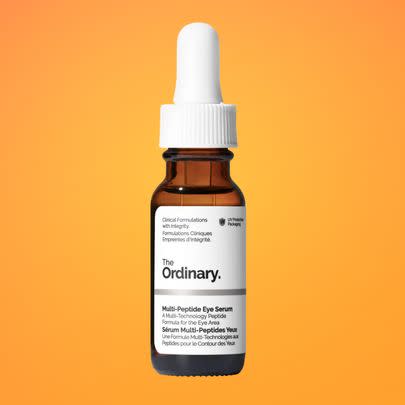
Sephora
The Ordinary Multi-Peptide eye serum
You can't beat the price of The Ordinary's skin care products, including this multi-peptide eye serum that's formulated to help diminish the look of dark circles and puffiness. It has a lightweight serum formulation that is a great option for those prone to breakouts or with excessively oily skin and, best of all, it is available for under $30. And while the price is right, beauty aficionados, HuffPost readers and editors alike also consistently turn to The Ordinary because of their products' efficacy.

Sephora
Laneige Water Bank Blue Hyaluronic eye cream
If you're after a silky smooth and soft eye cream that leaves your entire under-eye area feeling like it's been drenched in goodness, then you definitely want to check out this option from cult-fave beauty brand Laneige. It's made with hydrating hyaluronic acid, niacinamide to help brighten the skin and caffeine to revitalize. It's a great option for someone who is just starting to dabble in eye creams and wants to invest in their skin.
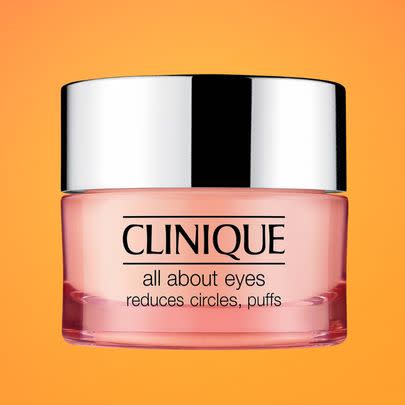
Ulta
Clinique All About Eyes cream
Dermatologists and HuffPost readers alike love this classic Clinique cream. Packed with vitamins C, caffeine and whey protein, it's a must for anyone who wants to look more bright-eyed and bushy-tailed. The formula leaves skin silky smooth, melting into the skin and acting as a great base for concealer. Not only can it help to reduce the look of darkness and puffiness, but it also soothes and hydrates the skin. This is yet another that's fragrance-free to help minimize skin allergy issues.
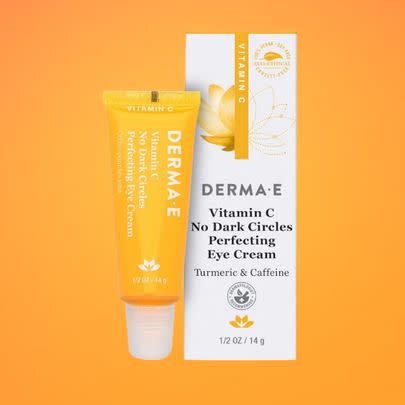
Amazon
Derma E Vitamin C No Dark Circles Perfecting eye cream
If it's dark circles you are looking to vanquish, then take a look at this reader-beloved, antioxidant-rich eye cream. It has a slight tint that essentially works like a color corrector while using the power of vitamin C, turmeric, mica and caffeine to potentially help even out skin tone, brighten the under-eye area and reduce the look of lines and wrinkles.

Sephora
Murad Retinol Youth Renewal eye serum
Formulated to correct and prevent nearly every aspect of premature skin aging around the eyes, Murad's Youth Renewal eye serum is part of the brand's clinical line of products for aging skin. It contains its exclusive retinol complex, which fights fine lines and irregular skin tone. It also contains agents that hydrate skin and claim to boost skin elasticity for a firmer appearance. You typically cannot go wrong with Murad products in general, so it's not surprising that HuffPost readers flocked to this serum.

Amazon
L'Oreal Paris Dermo-Expertise Eye Defense eye cream
Sometimes, a classic cream is the best way to go and there's a reason this L'Oreal cream has over 10,800 five-star reviews on Amazon! It's proof positive that you don't necessarily have to drop a huge chunk of change for an effective eye cream. It has a light, non-greasy gel-cream formulation made with caffeine and hyaluronic acid to address premature aging and keep the under-eye area supple and smooth.

